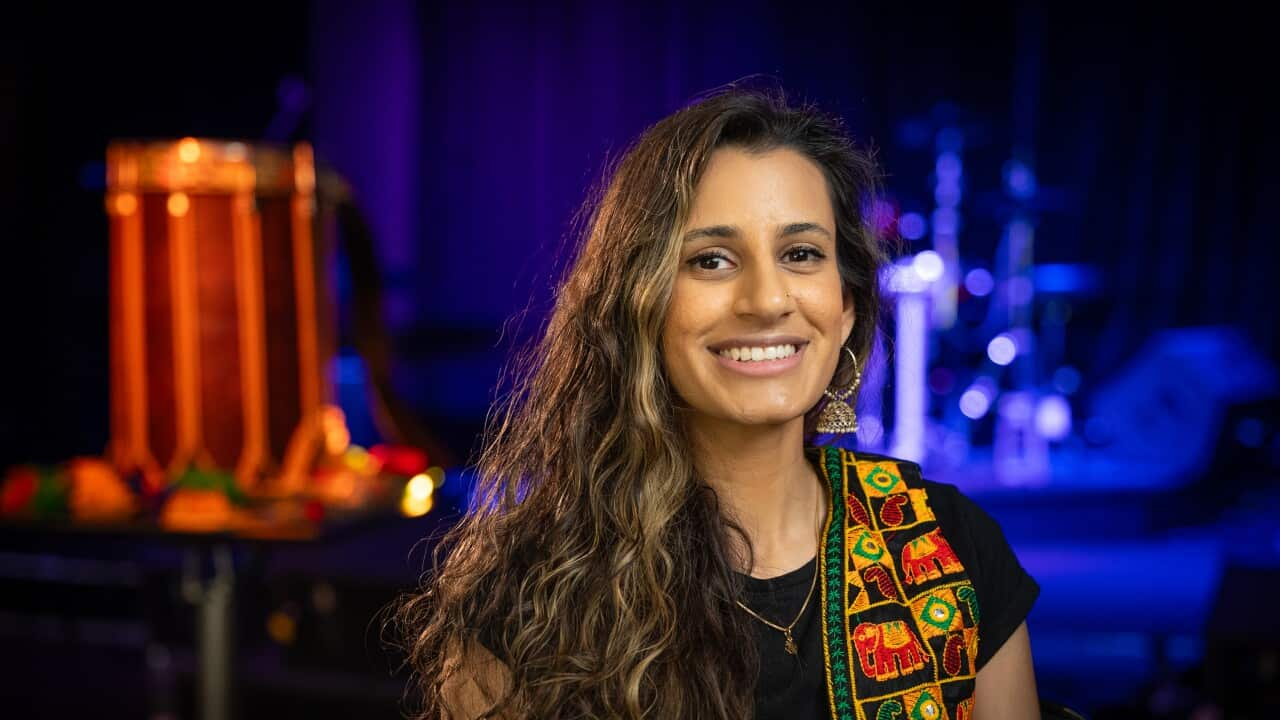Priya Gakhar is a slight woman who deftly handles a large wooden drum called a dhol. But beating out familiar Indian rhythms on this heavy two-headed instrument is not what makes Priya so special.
The 28-year-old is among a steadily growing number of female dholis in Australia. Even now, though, there may be as few as just five. And of that she is incredibly proud.
“Playing dhol is a very physical job and traditionally [in India] it was usually males who played it, because they tend to be bigger and stronger,” Priya says taking a break from practising at a Sydney studio.
“So, people are often surprised to see a female playing dhol. But I love breaking stereotypes and changing everything up. I get a lot of joy out of it.”

Priya demonstrating her dhol playing. Source: SBS News / Sandra Fulloon
Priya is preparing for several big Diwali functions in November along Australia’s east coast, and says other bookings are rolling in.
“I am excited to be playing a musical instrument so deeply ingrained in my culture, and I’m proud to be changing things up,” she says.
Even so she admits long performances can be challenging.
“My dhol weighs about eight kilos, and I am about 45 kilos, so it's quite heavy, so performing on stage can get very physically taxing. Sometimes I play for two hours straight, and my shoulder and back get sore after about 10 to 15 minutes of playing.
“But it's worth it for the joy that I get from playing and from bringing joy to other people.”
A dhol is made from carved wood, with a tin top and animal skin end. The instrument is often played at weddings, to welcome the groom.
Ironically, Priya embraces the fitness aspect of playing dhol. It is helping her to recover from a potentially life-threatening condition that emerged in 2018, while playing semi-professional soccer in the United States.
“During training I noticed that I was short of breath, I had a pain in my leg, and chest pain. I felt fatigued and knew something was a bit off.

Priya playing soccer in the USA. Source: Supplied / Priya Gakhar
“The doctors diagnosed blood clots in my lungs, around 12 sausage shaped clots."
Priya faced a long, slow recovery on blood thinning medication during COVID and was advised against vaccination. It was in isolation at home that she first handled a dhol.
“During lockdown it was very tough, so I started looking at dhol videos [online] and picked it up. It was very therapeutic, and a great way for me to keep my spirits up when I was sick.”
“My parents are very supportive, and happy that it brings me a lot of joy, so I love that.”
Fellow dholi Tika Karan is also proud to be breaking ground for women, but admits it isn’t always easy.
“In our culture, seeing women play dhol, especially for the older generation, it's quite hard to accept.
“So, it would be beautiful if male dholis were more welcoming to female dholis so we could play together and share the same platform.”
Multi-instrumentalist music coach Kelly Legg welcomes more young women moving into traditionally male-dominated areas of music.
“In the past drums, bass, electric guitar were really male-dominated as well as genres like rock, the heavier music.
“But we are really seeing a lot more women and non-cis [gender] males come to the stage now.
“Music is music, and none of these skills are gendered. Music is for everyone.”

Priya Gakhar with her dhol. Source: SBS News / Sandra Fulloon
“Just doing what I'm doing is something rare. It is rare.
"To see a female playing the dhol is a symbol of female empowerment, in itself.
“But every time I hear the sound of the dhol I love it, I want to dance, I want to play. It starts like a little fire inside of me. And I hope that happens to other people as well.”
This story was produced in collaboration with SBS Hindi and SBS Malayalam. For more on Priya's story visit









